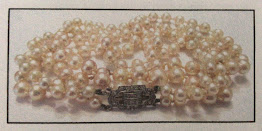Actually, over several years, we have gradually sold most of the jewellery she left me.
When I first went through all the jewels - and I use the term advisedly - it was quite overwhelming. There were things I'd forgotten she owned - and things I'd never seen. There were more rings than one person could reasonably wear, all set with precious gems (mostly sapphires, either blue or yellow). There were earrings to match, along with a string of glowing amber beads, watches and gold chains, and the pearls.
"Why have all this stuff if you never wear it or enjoy it?" This was one of my indignant questions, feeling angry, baffled and saddened all at once.
Some of the things were familiar. She wore them often, and they reminded me of her and of her love for showy jewellery. Some things were old, like her engagement ring and a small, pale purple amethyst pendant I remember her receiving one Christmas when I was a child. Others came from the years she and my dad spent in Saudi Arabia - flashy settings, heavy with the gold that everyone bought on an almost weekly basis. It was what you did: you visited the Gold Souk [market] on a Friday night, spending the dollar-based salary you were earning. It was generally seen as an investment. For my mother, her gold was a kind of insurance policy, making sure she got her share of what my dad was earning.
It was also her way of showing the world that she'd arrived, that she was somebody. I could see a pattern to her buying: she'd start out with a small version of what she aspired to - tiny tanzanite earrings, for example - but then buy a larger, more expensive version as soon as she could afford it.
This need to "show off", to display her wealth, was in constant conflict with the fear of being burgled or even attacked on the street and robbed of her jewellery. As time went on, she wore less and less of her jewellery when going out. It remained in a safe-box in the bank. I think even my mother forgot some of what she owned.
It has taken us several years to gradually sort through what I inherited - first getting it valued; then finding out how little of that value it can actually realise if sold; and then finally finding reliable buyers.
Each time we sorted, it was a process of keeping what we love, giving some away, selling some... Each time there was a loss, a connection gently untied, a goodbye said. Each time I grieved for the woman who owned it.
And with each piece I keep, each time I wear it, I remember her.


